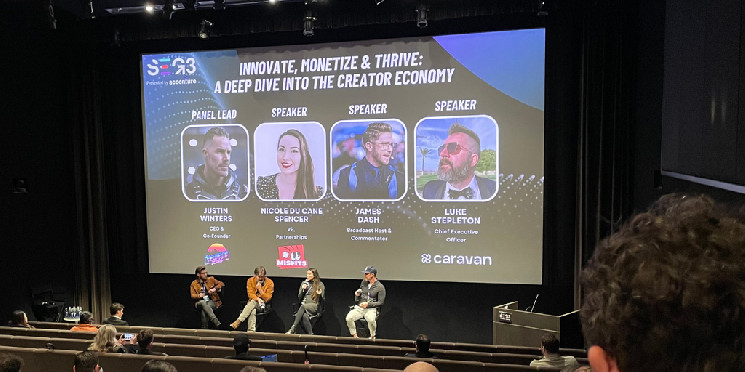Despite weathering an historic storm of collapses and scandals, the gaming and Web3 industries didn’t stop building. To continue that trajectory, attendees at the SEG3 conference in Los Angeles agreed that ownership rights and the resulting revenue are important. Less clear, however, was whether blockchain technology has a role to play.
SEG3, coming to California after two years in Europe, is pitched as a “global meeting place for sports, entertainment and gaming industries to connect and learn how to build better digital products and experiences.”
Epic Games Director of Business Development Craig Laliberte took the stage to showcase the many uses of Unreal Engine, including the creation of NFL team and Fortnite animations using the powerful tool. Laliberte also discussed the developer’s new digital assets marketplace FAB—but clarified that the images available to purchase were not NFTs.
“[FAB] is not going to be hosting any NFTs or blockchain-based things,” Laliberte said. “We’re gonna keep it to standard purchases.”
While crypto enthusiasts have championed blockchain technology for everything from gaming to healthcare, entertainment studios don’t appear bullish. And for many in the gaming industry, NFTs have become a dirty word associated with money grabs and scams.
Gamers have been vocal about their distaste for the crypto-based JPEGs. In 2022, Epic Games raised $2 billion to “build the metaverse,” but it did not include NFTs in its list of ambitions.
Despite distancing the new digital asset marketplace from the dreaded NFTs, Epic Games has allowed blockchain-based games in its Epic Game Store. The Solana ecosystem, including the developers behind the highly anticipated Star Atlas, has taken to the store as a viable alternative to platforms like Steam.
When asked how gamers can own the assets without using blockchain, Laliberte said gamers’ purchases aren’t limited to Epic Games’ technology.
“So the biggest thing is, we’re not locking you into Unreal Engine or UEFI when you can take stuff in and out as you see fit,” he told Decrypt. “Those assets are your assets, and you’re free to take them wherever you want.”
In another panel, Universal Music Group Senior VP of New Business Alvaro Velilla said there is no need to adopt blockchain technology.
“Despite how well crafted the strategy, there is no reason to adopt any of these technologies if doesn’t respond to a particular need or help you,” Velilla said. “The NFT protocol was finished in 2020 from a technology standpoint.”
But when attendees were asked what was the reason for not wanting to engage with blockchain even today, the answers came down to risk.
“Publicly traded companies are risk averse to blockchain, partly due to the association with the volatility of the cryptocurrency market but also scams and regulation,” a Sony Interactive Executive said. “Also, there is no real need for the technology.”
“Blockchain needs to be able to do what current technology already does to be worth the investment,” they said.
The crypto faithful, however, remain steadfast in the belief that proving who created and owns an asset through blockchain is necessary for real ownership.
“We talk about right-click save all the time,” Pogs Digital CEO and co-founder Kyler Frisbee told Decrypt. “It’s not real, authentic ownership unless you have something that establishes your ownership, and the blockchain is that fundamental ledger that’s decentralized, and that isn’t kept by some central entity that tells all of us who owns what.”
Frisbee emphasized that the only way to truly own an asset is to have real control oover it. His comments echoed those of award-winning director Christopher Nolan who—after his film Oppenheim was nominated for 13 Academy Awards—encouraged film lovers to buy physical media to own it and not rely on the benevolence of streaming services.
“I don’t know if real ownership happens unless it’s in your wallet, whether it’s a physical wallet or a digital wallet,” Frisbee said. “Whether your name is on the deed, there has to be some substantial way that we all recognize that proves ownership, and without a blockchain, I don’t see how that’s happened up until now.”
Edited by Ryan Ozawa.
Read the full article here

